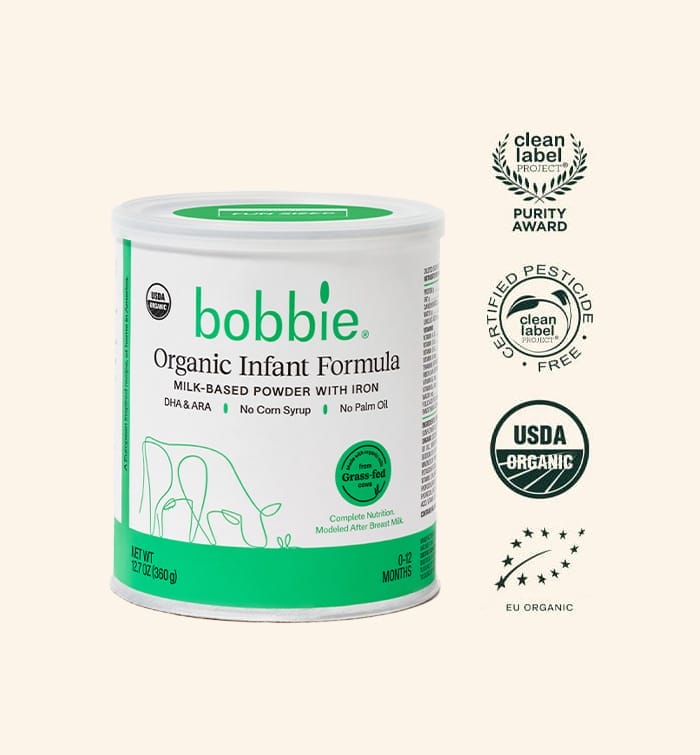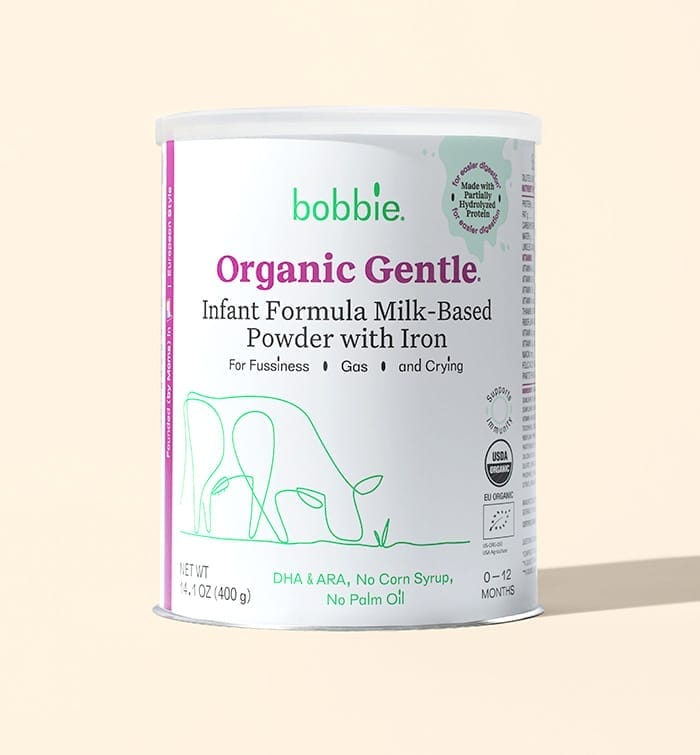We are proud to say that these posts are not sponsored. Our editorial team of Bobbie moms and writers personally select each featured product. If you buy something through our links, we may earn an affiliate commission, at no cost to you.
Many parents wonder how to know if infant formula agrees with their baby. Like lots of things with babies, it can be hard to tell sometimes since they can’t tell us how they feel. They can’t tell us what’s bothering them, what they like or what’s making them feel uncomfortable.
We’re here to break down your baby formula options, explain signs that could mean something is wrong, and share tips for when to contact your baby’s healthcare provider.
What are the types of baby formula options?
The Food and Drug Administration (FDA) has strict regulations about the ingredients and nutrients that must be in infant formula. Regardless of the brand, all brands of infant formula must contain the minimum requirements for vitamins, minerals, fat, protein, and carbohydrates.1
There are a few formula options to consider for your baby’s diet:
- Powder
- Liquid concentrate
- Ready-to-use
Powdered formula is often the least expensive option and ready-to-use formula is the most expensive one.2
Formulas can also differ by the type of protein they contain. Let’s take a look at some of the most common types.

Shop Bobbie Organic Infant Formula
Bobbie Organic Infant Formula is a USDA Organic, EU-style infant formula that meets all FDA requirements. It is a complete nutrition milk-based powder modeled after breast milk and is easy on tummies. It is non-GMO and doesn't have corn syrup, palm oil, or maltodextrin. Learn more about Bobbie.
Cow’s milk infant formula
Cow’s milk formula is the most commonly used infant formula and is well tolerated by most (but not all) babies. Lactose is the main carbohydrate used is cow’s milk formula.3
Cow’s milk formula is usually iron-fortified, which is important to prevent anemia (low red blood cells). However, some babies are allergic to cow’s milk protein, which is one reason a formula may seem like it doesn’t agree with your baby (more on this later!).4
Soy infant formula
Soy formulas use (you guessed it) soy as the protein. They also use corn-based carbohydrates instead of lactose, so soy formulas are both milk protein-free and lactose-free.
There are only a few medical indications for soy formula and they are mainly rare diseases. However, some families that maintain a plant-based lifestyle choose soy formula for their infants.4
Hydrolyzed and amino-acid infant formulas
These types of formulas contains proteins that have been broken down to be even more digestible. Doctors may recommend these formulas for babies who are allergic to cow’s milk protein.4
Using a feeding journal for your baby
If you think your baby is having symptoms that are caused by their formula, it might be a good idea to get a feeding journal so you can keep track of what’s happening and when it happens. Writing down details like what your baby ate, when they ate it, what symptoms they had, and what time the symptoms happened can be helpful if you end up seeing their healthcare provider about this issue.
A guide to common symptoms of discomfort in babies
Babies have lots of behaviors that may or may not be related to what they eat. Crying, gas, and fussiness can occur for lots of different reasons. This is why it can be helpful to write down what’s going on with your baby so you and your baby’s healthcare provider can try to get to the bottom of things.
Here are some symptoms to look out for:
Signs of an allergic reaction in babies
It’s not common, but some babies can be allergic to milk. Symptoms of a serious milk allergy include breaking out in a rash, coughing or trouble breathing, wheezing, or swelling of the lips or tongue.5
If you notice any of these symptoms in your baby, you should seek medical care immediately.
Diarrhea in babies
Babies can have diarrhea for lots of different reasons and not all of them are related to formula. To make matters even more confusing, there is a wide range of what’s considered normal baby poop.
However, poop that is watery, especially if it has blood in it, can be a sign of a milk protein intolerance. Other signs of milk protein intolerance include vomiting or spitting up, or increasing fussiness.6 If your baby has any of these symptoms, you should call their healthcare provider.
Extra gas in babies
Gas is common for infants, so this is another symptom that may be hard to pinpoint. It’s important to note if your baby has any of the symptoms discussed above like diarrhea, blood in their poop, or spitting up along with more gas than normal. If they do, this may point more to issues with their formula.
When in doubt, make note of it in your feeding journal and discuss your concerns with your baby’s healthcare provider. Don’t forget to note whether your baby seems uncomfortable from the extra gas, as this can be a helpful clue to what’s going on.

Shop Bobbie Organic Gentle Infant Formula
Bobbie Organic Gentle is the only baby formula in the U.S. market that offers 100% partially-hydrolyzed whey protein and 100% lactose as the carbohydrate source. Our gentle baby formula is easy on sensitive tummies to help alleviate fussiness and gas. Learn more about Bobbie Gentle.
Extra fussiness in babies
Like gassiness, fussiness is quite normal in babies. Some babies are so fussy they are considered to have colic, which is a way to describe excessive crying. It’s understandable that when your baby is crying a lot you’d want to look for a reason and a way to help them. So lots of parents wonder if formula could be to blame.
Similar to gassiness, it’s important to note any other symptoms with the fussiness like diarrhea or vomiting, since these can indicate formula intolerance. While there is not a lot of evidence that extra fussiness alone can be treated by changing formula, some healthcare providers may recommend trying this to see if it makes a difference.4,7 Keep that feeding journal and remember to never change formula without first talking to your baby’s healthcare provider.
When to change baby formula
If you think formula may be the cause your formula-fed baby’s symptoms, you may decide to switch to a new formula.
Always speak to your baby’s healthcare provider before changing formula. They can help guide you on which formula is the best choice for your baby and talk with you about how best to go about changing formulas.
Final thoughts on baby formula and if it agrees with your infant
Your baby is new to feeding on their own, and it’s common to experience minor hiccups. The best thing you can do for your little one is monitor their reactions, record any symptoms, and share your discoveries with professionals you trust.
Reach out to your baby’s pediatrician whenever you notice something is off- they are there to help! You’ll have all the information from the feeding journal as your guide and together you can make the best decision for how to feed your baby.

Shop Bobbie Organic Infant Formula
Bobbie Organic Infant Formula is a USDA Organic, EU-style infant formula that meets all FDA requirements. It is a complete nutrition milk-based powder modeled after breast milk and is easy on tummies. It is non-GMO and doesn't have corn syrup, palm oil, or maltodextrin. Learn more about Bobbie.
Sources:
1- Questions & answers for consumers concerning infant formula | Food and Drug Administration
2- Bottle-feeding (formula) questions | Seattle Children’s
3- Infant formulas | Pediatrics in Review
4- Infant formula | American Family Physician
7- Dietary modifications for infantile colic | The Cochrane Database of Systematic Reviews

